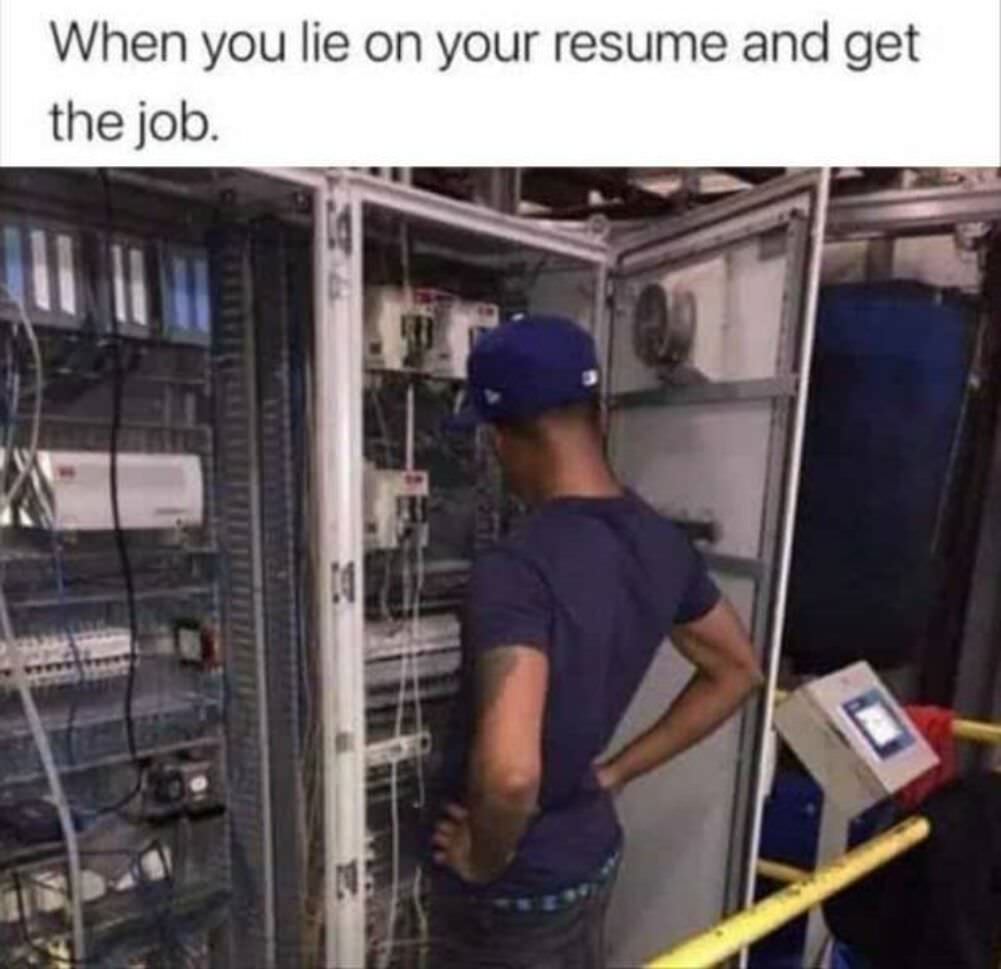When You Lie On Your Resume Meme Electrician: A Comprehensive Guide To Career Ethics And Professionalism
Mar 30 2025
Have you ever come across the meme "When you lie on your resume"? It's a humorous take on the consequences of exaggerating skills or qualifications on your resume. While it might seem like a lighthearted joke, the reality of lying on a resume can have serious implications, especially for professionals in fields like electricians where safety and expertise are critical. In this article, we will explore the topic of resume honesty, its impact on careers, and why it matters in the electrician industry.
Aspiring electricians or those already in the field might feel tempted to embellish their resumes to secure better job opportunities. However, doing so could lead to legal and professional repercussions. This article aims to provide valuable insights into the importance of honesty in resumes and how it affects not only individual careers but also the industry as a whole.
By the end of this guide, you will understand the risks associated with lying on your resume, the ethical implications, and how to build a strong professional reputation without resorting to deceit. Let’s dive in!
Read also:Coral Braces Transforming Smiles With Cuttingedge Orthodontic Technology
Table of Contents
- Introduction
- Understanding Resume Lies
- Impact on Electricians
- Legal Consequences
- Ethical Considerations
- How to Build a Strong Resume
- Common Mistakes to Avoid
- Why Honesty Matters
- Real-Life Examples
- Conclusion
Introduction
In today’s competitive job market, many candidates feel the pressure to stand out. For electricians, this pressure can sometimes lead to embellishing qualifications or skills on resumes. While memes like "When you lie on your resume" bring humor to the situation, the truth is that resume lies can have far-reaching consequences.
This article will delve into the reasons why individuals lie on their resumes, the risks involved, and how it specifically affects electricians. We will also discuss the importance of maintaining integrity in your professional life and how to craft a resume that accurately reflects your skills and experience.
Understanding Resume Lies
What Are Resume Lies?
Resume lies refer to any false information included on a resume to make the candidate appear more qualified or experienced. This can range from exaggerating job titles to fabricating certifications or skills. While it might seem harmless, these lies can backfire in various ways.
Types of Resume Lies
- Exaggerating job responsibilities
- Fabricating educational qualifications
- Claiming certifications that were never obtained
- Listing fake references
Understanding the different types of resume lies can help job seekers recognize the risks and avoid them.
Impact on Electricians
Why Honesty Matters in the Electrician Field
For electricians, honesty on resumes is crucial because the job involves working with high-voltage equipment and ensuring safety standards are met. A lack of proper training or certification can lead to accidents, endangering both the electrician and others on the job site.
According to the U.S. Bureau of Labor Statistics, electricians must have a combination of education, training, and experience to perform their duties effectively. Lying about these qualifications can compromise safety and result in severe consequences.
Read also:Caylee Mastin Autopsy Unveiling The Truth Behind The Tragic Case
Risks for Electricians
- Increased likelihood of accidents
- Damage to professional reputation
- Potential legal action
These risks highlight the importance of being truthful on your resume, especially in a field as critical as electrical work.
Legal Consequences
What Happens When You Get Caught?
Getting caught lying on your resume can lead to legal consequences, depending on the severity of the falsehood. Employers may terminate your employment, and in some cases, legal action can be taken if the lie resulted in financial loss or harm.
A study by CareerBuilder found that 75% of HR managers have caught candidates lying on their resumes. This statistic underscores the importance of honesty in job applications.
Legal Implications for Electricians
For electricians, lying about certifications or licenses can result in fines, revocation of licenses, and even criminal charges if safety standards are compromised. It’s essential to understand the legal framework surrounding professional qualifications in the electrician field.
Ethical Considerations
Why Ethics Matter in Professional Life
Ethics play a vital role in maintaining trust and integrity in the workplace. For electricians, this means adhering to industry standards and being transparent about qualifications and skills. Ethical behavior not only protects individuals but also enhances the reputation of the entire profession.
Building Trust with Clients
Clients rely on electricians to ensure their homes or businesses are safe and compliant with regulations. By being honest about your capabilities, you build trust and establish long-term relationships with clients.
How to Build a Strong Resume
Highlighting Relevant Skills
Instead of lying on your resume, focus on highlighting the skills and qualifications you genuinely possess. Tailor your resume to the job description, emphasizing your experience and achievements.
Using Keywords Effectively
Incorporate industry-specific keywords naturally into your resume. For electricians, this might include terms like "NEC compliance," "OSHA standards," and "troubleshooting skills." Using these keywords can improve your chances of getting noticed by hiring managers.
Common Mistakes to Avoid
Overstating Experience
One common mistake is overstating the length of time spent in a particular role or exaggerating job responsibilities. Always be honest about your work history and what you accomplished in each position.
Ignoring Gaps in Employment
Another mistake is trying to hide employment gaps by extending dates or fabricating jobs. Instead, address these gaps honestly and explain how you utilized that time to enhance your skills.
Why Honesty Matters
The Long-Term Benefits of Honesty
While lying on your resume might help you land a job in the short term, it can hinder your career growth in the long run. Being honest about your qualifications allows you to take on roles that match your skills, leading to greater job satisfaction and success.
Building a Strong Professional Reputation
A strong professional reputation is built on trust and integrity. By being honest on your resume, you demonstrate these qualities to potential employers and colleagues, setting yourself up for long-term success in your career.
Real-Life Examples
Case Study: The Consequences of Lying
Consider the case of an electrician who fabricated a certification on their resume. When hired, they struggled to perform tasks that required the certification, leading to a dangerous situation on the job site. The employer discovered the lie and terminated the electrician, damaging their reputation in the industry.
Success Stories of Honesty
On the other hand, electricians who have been honest about their qualifications have often found success in their careers. By focusing on continuous learning and skill development, they have built strong reputations and secured long-term employment.
Conclusion
In conclusion, lying on your resume, especially in the electrician field, can have serious consequences that affect both your career and the industry. By understanding the risks and focusing on building a strong, honest resume, you can set yourself up for long-term success.
We encourage you to share your thoughts in the comments below or explore other articles on our site for more insights into career development and professionalism. Remember, honesty is the foundation of a successful career, and it starts with your resume.


